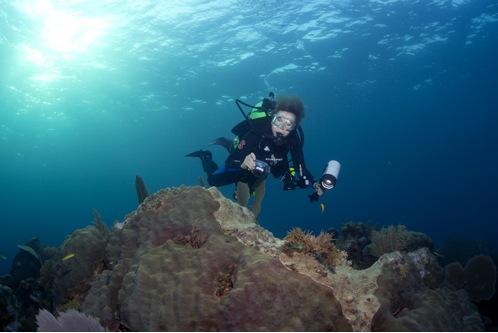Reminiscences of Dr Allan Heydorn of diving with Dr Sylvia Earle
Dr Allan E.F. Heydorn, Marine and Coastal Ecologist and part-time resident of Betty’s Bay, is one of the doyens of South African marine ecology, and it is a pleasure and privilege to share his reminiscences of diving with Dr Sylvia Earle in this interview:
 “In the mid-1970s, I was Director of the SA Association for Marine Biological Research (SAAMBR) in Durban. The Oceanographic Research Institute and the Durban Aquarium/Dolphinarium both fell under the auspices of SAAMBR. As a matter of fact, the Dolphinarium was developed during my tenure as SAAMBR Director. During the design-phase of the Dolphinarium, I visited marine mammal research institutions in various parts of the world, including the USA. That is where I met Sylvia Earle for the first time. We immediately ‘clicked’, which was not surprising as we shared so many interests revolving around the sea and especially in the underwater realm. And, we were both passionate divers.
“In the mid-1970s, I was Director of the SA Association for Marine Biological Research (SAAMBR) in Durban. The Oceanographic Research Institute and the Durban Aquarium/Dolphinarium both fell under the auspices of SAAMBR. As a matter of fact, the Dolphinarium was developed during my tenure as SAAMBR Director. During the design-phase of the Dolphinarium, I visited marine mammal research institutions in various parts of the world, including the USA. That is where I met Sylvia Earle for the first time. We immediately ‘clicked’, which was not surprising as we shared so many interests revolving around the sea and especially in the underwater realm. And, we were both passionate divers.
Sylvia and I had long discussions about the concept of keeping marine mammals in captivity. We were (and I think we still are) in agreement that the main function of dolphinaria should be study and research focussing on these magnificent creatures. The purpose must be to contribute to their protection in their natural habitat – the sea and in some cases in rivers. We both felt that it was an incredible experience and privilege to be able to swim and dive with marine mammals ranging from the smallest dolphins to whales but also with others such as seals and otters.
In my case surfing with dolphins was also an experience very high on my priority list. Sylvia and I furthermore agreed that dolphins should not be used for the sole purpose of circus-type of exhibitions and money-making. Artificial dolphin shows can only be justified if they simultaneously educate people about what dolphins really are - mammals adapted incredibly well for life in the sea. Dolphin shows should also be used to provide knowledge about the conservation needs.

These discussions had a very substantial influence on the design and the operation of the Durban Dolphinarium. This included a rehabilitation facility for sick or injured marine mammals which are washed up periodically on the shore. Not surprisingly, I invited Sylvia to visit us in South Africa and to see the Durban Dolphinarium and of course, the work of the Oceanographic Research Institute.
Sylvia and I dived and swam together in the Dolphinarium and in the sea. It was a huge pleasure to work with her. Prof Margaret Smith of the JLB Smith Institute (Grahamstown) and I also took her on a trip covering various points along the South African coastline. On the way to Betty’s Bay at Kogelbaai, we saw two Southern Right whales fairly close to the shore. I will never forget Sylvia’s joy and excitement about the close-range sighting of these magnificent animals.
Sylvia’s diving exploits have, of course, far exceeded mine - even though I worked for many years as an underwater scientist. I have for many years followed her many exploits and admire her spirit, courage, dedication and inexhaustible energy.”
Interview with Dr Allan E.F. Heydorn by Carole Knight
Source
© Written, Research and Photos: Carole Knight - http://caroleknight.co.za/
Call us and schedule your listing today! Contact Us
Copyright © 2025 Hermanus Online Magazine. Web Development by Jaydee media.

